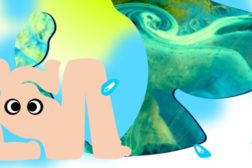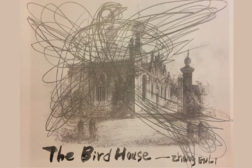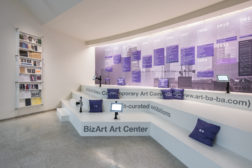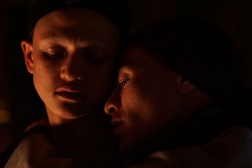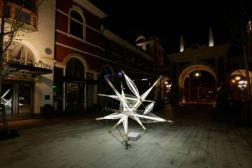
Double Infinity: The Last Two Decades Revisited
The symposium is organised by Arthub and the Van Abbemuseum.
Venue: Dutch Cultural Centre
800 Changde Lu, Changping Lu, Shanghai
Full Schedule for Double Infinity below:
SATURDAY, May 15
11:00–12:30 pm
Panel Discussion: Cracking Open Once Again: The Timeline of Chinese Art History. Part 1: 1979-1995 (approximately)
What are the possible narratives for Chinese contemporary art history?Is there ever an agreed history? What kind of timelines could be drawn throughout Chinese art history? Does this way of thinking about cultural developments in China make sense, or does it borrow too much from western art historical models? The maleable Chinese art history takes its twists and turns, both from 1979 and 1989 onwards. What happened between these points and since then? What were the consequences of the diaspora after 1989? What could be meant by the continuation of points of encounters from 1920’s onwards?
Participants: Song Haidong (artist), Chen Tong (artist/publisher), Dr. Paul Gladston (art historian), moderated by Carol Yinghua Lu
12:30–13:15 pm
Screening of Asia Art Archive Documentary: From Jean-Paul Sartre to Teresa Teng: Contemporary Cantonese Art in the 1980’s
Based on primary research, rare film footage and personal interviews with key artists, AAA’s documentary bears witness to the “reading fever” that gripped the Chinese art world in the 1980’s. But it also highlights the experimentalism and verve of artists and critics in South China whose contributions to the development of contemporary art have been deep and long lasting. The documentary will be followed by a short question and answer session.
LUNCH BREAK
14:30-16:00 pm
Panel Discussion: Points of Encounter: The Reception of Chinese Art as Shaped Abroad–Perceptions and Exoticism. Part II: 1995-2010
Why is China adopting western models and structures? Has Chinese contemporary art been instrumentalised by the international art system, and does this continue to occur? Did Chinese artists play the game, not realising the long-term effects of this process on the artistic environment in China? Where does the “mainstream” art that artists are so concerned with start? Isn’t art more about the media and impact these days? How much of an outsider can one be? How can contemporary art deal with itself when fenced within creative industries? Why does everybody seem so fed up with talking about China in relation to the West? Is there a possible way of approaching this exhausted theme, making it new and relevant? Is there any hope for cultural exchange?
Participants: Li Zhenhua, Qiu Zhijie, Hu Jieming, moderated by Davide Quadrio
Respondent: Zhang Peili
16:00 PM-17:00 PM
Rites of Passage by Julika Rudelius. Originally conceived as a film, Rudelius organises a live work around the notion of translation. Her piece will be simultaneously translated, creating a continuous shifting of meaning in the work.
SUNDAY, May 16
11:00-12:15 PM
A keynote lecture on Globalism/Internationalism/Localism by Pieter van Wesemael puts the Shanghai World Exhibition into its historical context and looks at how World Expos have reflected international and globalist politics since their inception.
12:15-13:45 PM
Panel Discussion: Global Claims, Local Effects
Panelists look at inter-European cultural conditions, particularly since 1989, and introduce specific cases from elsewhere in the non-western world, including the post-Soviet Caucasus and Republic of Korea. What might it mean to connect Chinese and other non-western situations in cultural production and presentation? Is a new kind of non-aligned cultural movement useful or possible? How are artistic histories in these regions recorded and written and how might the received narratives be questioned? What is the influence of European modernism on the extra-European world given that it was exported as a universalist form alongside colonialism and socialism in former Third World countries? To what extent do developments in countries such as former Eastern Europe or Turkey mirror the post-1989 experience in China? How do they differ?
Participants: Defne Ayas, Charles Esche, Kim Hyun Jin and Georg Schöllhammer
14.30-16:00 PM
Panel Discussion: Localism and Social Engagement in the City
Panelists will address socially engaged forms of artistic production in urban context, highlighting collective/collaborative efforts, multiplicity, and open-ended experimentation, both historically and currently, in China and across Asia. Is an autonomous art practice a possibility at all? Must contemporary practices be isolated, out of public view? What is the meaning of avant-garde? What are the problems of translating artistic practices?
Participants: Tsuyoshi Ozawa (Xijing Men), Jin Shan (Shu Fu Collective), Alexander Brandt, Beatrice Leanza, moderated by Defne Ayas
Respondent: Gao Shiming
16:00-17:00 PM
Golden Ghost (Double happiness comes to the door) by Surasi Kusolwong.
Thai artist, Surasi Kusolwong has installed a whole room full of waste thread material in which a golden necklace is hidden every week and can be found by lucky visitors. The finder is able to keep the necklace, making the “game” a potentially profitable experience, while also playing with the extremes of value within society.
Translators will be provided at each event.
About Double Infinity
Double Infinity is a collaborative encounter between the Van Abbemuseum and Arthub Asia, situated in and around the Dutch Culture Centre in Shanghai, parallel to the World Expo 2010. The Double Infinity project loops through and crosses over itself time and again. It is at one and the same moment an exhibition, a performance series, a lecture programme, a publication, a promotional tool, a celebration, a collaboration and a playful look at international relations. It marks the first time that a European museum opens itself and its collection to the responses of artists living and working in China–responses that form a host of enriching, humorous and critical insights.
Participating Artists: Lara Almacergui, Johanna Billing, Stanley Brouwn, Comfortable Collective (Jin Shan, Gao Mingyan, Li Mu, Maya Kramer), Cao Fei, Alicia Framis, Liu Gang, HHD_FUN (Wang Zhenfei and Wang Luming), Job Koelewijn, John Körmeling, Surasi Kusolwong, El Lissitzky, David Maljkovic, Julika Rudelius, Speedism, Xu Tan, Zhou Xiaohu, Xijing Men (Chen Shaoxiong, Gimhongsok, Tsuyoshi Ozawa)
Curators: Charles Esche, Defne Ayas, Davide Quadrio and Remco de Blaaij
Partners: Netherlands China Arts Foundation, Gemeente Eindhoven, Dutch Culture Centre, Mondriaan Foundation, DutchDFA (Dutch Design Fashion and Architecture) and Shama Xujiahui
